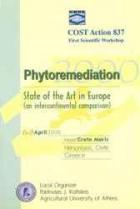
Tree Physiology and Pathogens and Pests - Management Committee and Scientific Workshop

Weather Radar Networking-Activity Report

European Symposium-Physico-Chemical Behaviour of Atmospheric Pollutants

Phytoremediation - State of the Art in Europe (an intercontinental comparison)

Power Metallurgy - Powder-based Materials Vol I - General Introduction, Policies and Strategies

Fate of Polloutants in the Plant/Rhizosphare System: Fundamental Aspects and Their Significance for Field Applications - Prospects and Research Needs

Spatial Interpolation in Climatology and Meteorology
- Pages: 257
- Author(s): Szalai, Bihari, Szentimrey, Lakatos
- Publisher(s): OPOCE
- Download from external website
- ISBN/ISSN: 978-92-898-0033-4
- EUR: 22596
Proceedings from the conference, 2004, Budapest.

Benefits of Non-destructive Analytical Techniques for Conservation
- Pages: 122 pages
- Author(s): A. Adriaens, C. Degrigny, J. Cassar
- Publisher(s): EU Publications Office (OPOCE)
- http://bookshop.europa.eu/uri?target=EUB:NOTICE:QSNA21636:EN:HTML
- ISBN/ISSN: 978-92-898-0010-5
- EUR: 21636
This book contains 12 fully refereed papers and five abstracts, presented at the COST Action G8 international workshop on ‘Benefits of non-destructive analytical techniques for conservation’, which was organised at the Malta Centre for Restoration in January 2004. Three approaches of how professionals can benefit from non-destructive and/or non-invasive analytical techniques are presented. Training in analytical techniques at various conservation schools is considered first, followed by how these techniques are utilised in conservation laboratories working on museum artefacts, or during on-site investigations of built structures. Finally, the recent interest of research laboratories is discussed.

Integrated Assessment of Environmental Impact of Traffic and Transport Infrastructure
- Pages: 405
- Author(s): E.J. Caldéron, C. Pronello, T. Goger
- Publisher(s): Servicio de Publicaciones ETS Ingenieros de Caminos
- ISBN/ISSN: 978-84-7493-401-4
This book is the outcome of the COST Action 350. The main objective of the book is to establish operational guidance for the assessment and integration of the relevant environmental impacts of transport plans and programmes in order to provide support in the decision-making process, assisting planners in the early stages of drafting transport plans and programmes.
